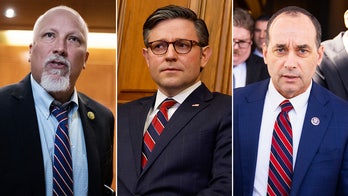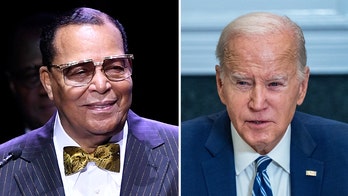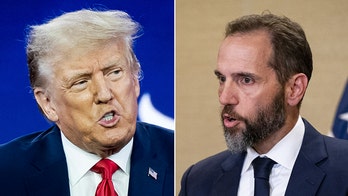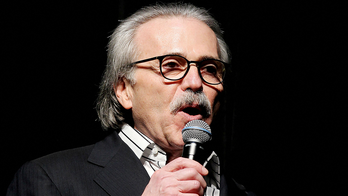Much attention has been given to President Obama's persistent use of "I" when giving speeches to sell his administration's agenda. Is he taking responsibility -- or, as his critics say, is he still in campaign mode? FoxNews.com is tracking the president's speeches all this month and will report back after each to see whether The "I's" Have It.
Today's Speech: Obama's remarks on a jobs tax credit at Chesapeake Machine in Baltimore.
Subject: Jobs, the economy
Speech length: 2,089
Number of "I" references: 43
The following is a transcript of Obama's remarks:
Thank you. Thank you everybody. Thank you so much.
I've got a couple of introductions that I want to make very quickly.
First, I want to thank Terry and his family for greeting me here today. And I want to thank Terry and Joe for giving us a tour of Chesapeake Machine Company.
In addition, we've got Secretary Ray LaHood, the secretary of transportation. Where is he? Ray, way in the back. He's waving.
We've got your governor, Martin O'Malley in the house.
(Applause)
We've got, I believe, your outstanding senator, Barbara Mikulski...
(Applause)
... a couple of great members of Congress, Congressman John Sarbanes and Congressman Elijah Cummings.
(Applause)
And we've got Council President Stephanie Rawlings-Blake, your next mayor of Baltimore.
(Applause)
Now, I -- I was thrilled to get the tour. First of all, I just like getting out of the White House. And then I like tooling around, you know, companies that are actually making stuff. And I want to tell you all I'm very impressed with the work that you do, and you know, I have to say that when you get out of Washington and you come here, it's nice to see a functioning, well-oiled machine. That's a nice change of pace from what we see sometimes up in Washington.
As we stand here today, our country is still reeling from a recession that's as tough, as deep and as dire as anything that we've known for generations. And I don't need to tell you a lot of families are hurting out there, businesses are struggling, one in 10 Americans can't find work.
And so I know that during these tough times, folks at this company feel relatively lucky to be working, even when the work is hard and the days are long, because everybody knows that there's somebody out there who's not as fortunate -- a friend or a neighbor, maybe even a husband or a wife.
But even in the face of these challenges, we have reason to remain hopeful.
As I was listening to Terry and Joe talk about some of the business opportunities that are out there for solar panel constructions and, you know, high-speed rail construction, the great work that they're doing on behalf of our troops as part of a contract -- all those things are going to be making a difference. And it points to the possibilities of sustainable growth.
And the fact is, we're standing in a very different place than we were just a year ago. Just last year, businesses were cutting 700,000 jobs per month. The markets were plummeting. Many people feared another Great Depression.
Today, we've stopped the flood of job losses. We've stabilized the financial system. And we can safely say that we've avoided that looming depression.
This morning, we received a report that affirms our progress and the swift and aggressive actions that made it possible. We learned that the economy grew over the past three months at a rate of 5.7 percent.
Now, just to give you perspective there, that's the fastest economic growth in six years, and it's a stark improvement over the rapid and terrible decline that we were experiencing one year ago.
Earlier this week, I spoke to Congress and the American people about the steps that we took to pull us out of this nosedive. Through the Recovery Act, we cut taxes for 95 percent of working families. You guys may not have noticed it in your paychecks, but there each month it's a little bit bigger because of those tax cuts that we put in -- 2 million families just in this state of Maryland have benefited.
We cut taxes for college students and first-time homebuyers and small businesses. We made health insurance cheaper through COBRA, so some of you know friends and family members who've lost their jobs, but they kept their health insurance because COBRA was 65 cheaper -- percent cheaper than it would have otherwise been. And we extended unemployment insurance for folks who've lost their jobs, including more than 200,000 people here in Maryland.
We created and saved 2 million jobs -- that's 2 million teachers and firefighters, police officers, builders, manufacturing workers and others who are on the job today because of some of the steps that we took.
Now, I've got to admit not all the steps we took were great politics. You know, I talked about this a little bit at my State of the Union. You know, if you were going to list the 100 most popular things that -- that I have done as president, being married to Michelle Obama is number one -- bailing out banks and rescuing failing auto companies doesn't make the list. Those things weren't popular, but I didn't run for president just to do what was popular. I ran for president to do what was right for the country.
In the midst of a really bad recession and the possibility of financial meltdown, preventing the collapse of our banks, and with it the access to lending and credit, and preventing hundreds of thousands of job losses that would have followed the collapse of two or our major automakers, that was the right thing to do. It was the right thing to do. It was the necessary thing to do. It might have not been popular, and I sure didn't like doing it, but it was the right thing to do.
And as bad as the damage has been in this recession, without those actions, the damage could have been far more extensive.
Now, even though the storms of the past two years are starting to lessen, the wreckage that's been left behind remains. While the Recovery Act has created and saved 2 million jobs, this recession has cost us 7 million jobs. So there's still a big gap, still a big hole that we have to fill.
And it represents a terrible human tragedy, as families are thrown into hardship and uncertainty. But the good news is today's report means that we're increasing GDP, we're increasing economic growth. That means businesses are going to start to see more customers and hopefully, even here in Chesapeake, you might start seeing enough orders that you start needing to hire that extra shift. That could make a big difference.
Now, in the meantime, though, there are a lot of folks who are still out of work. And what they're saying is, "When am I going to get some help? When am I going to get some relief?" For these folks, a good job is the only good news that matters.
And that's why when I spoke to the nation earlier this week, I called on Congress to pass a jobs bill without delay. And this jobs bill should start where most new jobs do: in America's small businesses, companies like this one.
Today, I'm proposing what I believe is the best way to cut taxes, while promoting hiring by small businesses, through a tax credit for companies that add workers or increase salaries this year.
Now is the perfect time for this kind of incentive, because the economy is growing, but businesses are still hesitant to start hiring again.
The economy's growing, but job growth is lagging. Companies are recovering but not yet taking that next step and taking on somebody full time.
And while businesses will always be engines of job creation in this country, government can create the conditions for those businesses to expand and hire more workers.
So here's how the tax credit would work. Employers, like Terry, would get a tax credit of up to $5,000 for each and every employee that they add in 2010. And you would get a tax break for increases in salaries as well.
So if you raise wages for employees making under $100,000, we'd refund your payroll taxes for every dollar that you increase those wages faster than inflation.
So this is a simple, easy-to-understand mechanism that will cut taxes for more than 1 million small businesses. It'll give them an incentive to hire more people and a little bit of extra money to pay higher wages, to expand work hours or invest in their company.
And in order to get this incentive working quickly, employers would actually be able to receive this money every quarter, as opposed to waiting a whole year to see it benefit their taxes.
So the Chesapeake Machine Company is a perfect example.
I understand, Terry, that you may be thinking about hiring a couple of new workers this year. Well, this tax credit could help you do it, and it would mean $5,000 per worker that you hire.
Now, it's true that in some instances this tax credit will go to businesses that were going to hire folks anyway. But then it simply becomes a tax cut for small businesses that will spur investment and expansion, and that's a good thing, too. And that's why this type of tax cut is considered by economists, who rarely agree on anything, to be one of the most cost-effective ways of accelerating job growth, especially because we will include provisions to prevent people from gaming the system.
So, for example, you won't get a tax credit for doubling your work force while cutting the hours of each worker in half. You know, we're not going to let you game the system and take advantage of the tax credit unless you're doing.
And, finally, this is only one part of the jobs package that I've proposed.
I'm also calling for additional investments in infrastructure. We were just talking -- Terry and I and Joe, we were just talking about the fact that part of their business right now has to do with rail lines and they're doing some work for Amtrak. We were just talking about the fact that part of it has to do with solar companies. Well, we want to increase our investment in clean energy.
All of this is going to create jobs in the short term, while helping our economy in the long run.
And I've proposed taking some of the money that went to the big banks on Wall Street to help bolster the financial system, and give it to smaller community banks that lend to small businesses like Chesapeake, because too many companies that I'm seeing out there still can't find affordable credit.
The House of Representatives has passed a jobs bill that includes some of these proposals. I expect the Senate to do the same.
I'm open to any good ideas from Democrats or Republicans. In fact, several members of Congress have proposed tax breaks for businesses similar to what I've proposed, and I'm looking forward to working with them.
The key thing is it's time to put America back to work. We've had two very tough years. And while these proposals will create jobs all across the America, we've got a long way to go to make up for the millions of jobs that we lost in this recession. And I don't have to tell folks in Baltimore that even before this recession hit, the middle class was facing real hardships: stagnant incomes, rising costs, growing economic security.
So rebuilding this economy and rebuilding it stronger than before will take time and it's going to take hard work and vigilance, but I know we can do it. You don't need to look any further than the folks here at this company. In one form or another, people have been working and building right here for nearly a century, starting back when Terry's grandfather was calling the shots.
In good times and bad, through storms and still waters, men like you have gotten up and women like you have gotten up and gone to work and put in long days and headed home. You're a little tired, but you're glad for the opportunity to make a living, while helping this country become the most productive, innovative economy in the world.
Small businesses have powered our economy in the past. They are fostering our recovery today. I have no doubt if we support you, that small businesses like this one will lead us to more prosperous days ahead.
So thanks for all the great work you do. Thanks for hosting me. I know you guys probably had to fuss a little to get ready for us, but I can tell you from my perspective at least, it was a great visit. I appreciate everything you did. Good luck. All right. (Applause)




